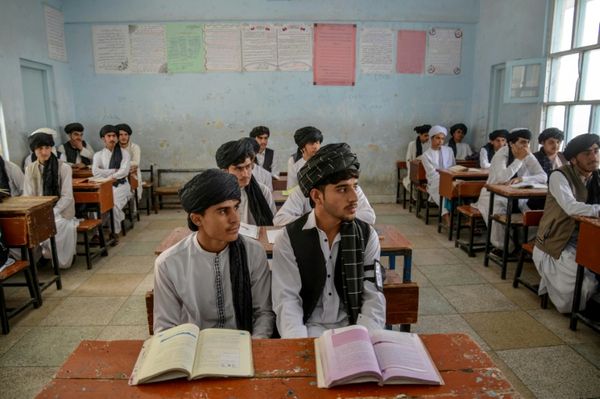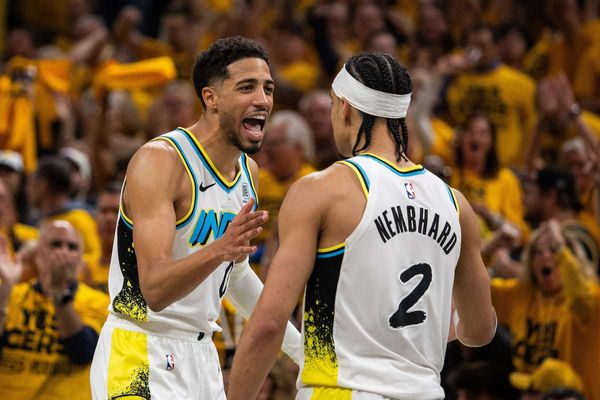
Tout puissant. Magnifique. The golden city. At times during the opening week of Paris 2024 there has been a vague sense of being a guest at someone else’s party. A chic and very beautiful party, but one where you are nonetheless cast in the role of background filler, meat in the room, assiduous canapé waiter patrolling the halls with your tray as France hogs the karaoke, disco-dances in the centre of the lighted floor and generally has the time of its sporting life.
One week in, the Games have so far been grand, exhilarating, and unusually light and sustainable in their staging. But the big moments have mainly been Francophone, from delight at the men’s rugby sevens victory – France’s players are still engaged in an unceasing celebration; a selection of them were seen most recently dancing in sunglasses in Ibiza – to an opening ceremony that was basically a slick and persuasive TV advert for Paris, to the wonderful spectacle of the triathlon that felt at times like a mashup of ominous pollution bulletins and a super-shiny chocolate box Netflix series, E coli in Paris.
Wednesday at La Défense Arena also brought a perfect meeting of home talent and Olympic spectacle as Léon Marchand’s double gold in one evening enthroned him as both the face of Paris 2024 and an object of almost visceral national yearning. “There are evenings when time stands still, when the picture in front of our eyes appears almost as an illusion, and its creator knocks on the door of history.” This isn’t William Blake or Barbara Cartland, or the tagline for an excitable brand of male cologne. This is the front page of dear old Le Monde, France’s hyper-serious broadsheet of record, talking in a state of throat-flushing, thigh- rubbing excitement about a man in a rubber hat swimming fast.
It has been a glorious midsummer swoon, undampened by the rain or even, to date, the gathering storm in a wretchedly mismanaged boxing competition. France needed this. A nation that is otherwise in stasis, caught between prime ministers, confused by the rise of its Le Pen-ist far right, is now flying flags out of car windows, gorging itself on sweetness and feeling, of all things good. It shouldn’t come as a surprise. The Olympics are designed to create these emotions. Huge amounts of money have been spent engendering that spontaneous sense of wellbeing. We remember London 2012, which was also joyful and patriotic. Sport is a powerful intoxicant. The feelings can, however, fade with the summer leaves.
For now the only surefire winner after the first week of Paris 2024 is the International Olympic Committee, which desperately needed a good Games as it looks to re-establish its rhythm after the fever dream of Tokyo. One week in we have colour and light and a sense of scale. But there are still two key elements remaining as Paris clicks into week two.
For these Games to be great they need to do more than speak to the pre-converted or pump up the tyres of its host nation. The legend of the Games is built on moments of competition, the sense that what we have here is a kind of sporting ultimacy. The middle-aged NBC subscriber base may already have that shared folk memory, but not so much the younger audience. A pre-Games survey by the company EduBirdie suggested almost 90% of the UK’s generation Z demographic had never watched a single minute of the Olympics and that one in three wouldn’t notice if the Games were cancelled.
This is perhaps a little alarmist. A large portion of people in their 20s wouldn’t notice if Christmas was cancelled, or the pension industry, or the entire global output of regular TV channels. But the IOC will still be concerned. If this unwieldy, essentially quite strange event is to remake its mark among a more diffuse and youthful audience two things need to happen.
First, there is a need for a genuine sense of overlap and unity. Wonderful moments aside, Paris has been a little atomised so far. In part this is a function of so many different venues. But it is also an existential issue. The Olympics are basically an idea, separate elements – horse dancing: meet the pole vault – that need to be actively bound into a single entity.
At times Paris has felt like a series of excellent events taking place simultaneously, often divvied up along national lines. So on Tuesday lunchtime the South Paris Arena staged a brilliant and also notably east Asian series of table tennis finals, China’s domestic stars cheered by a large Chinese crowd, local rivalries rehearsed. That same evening at Bercy Arena, the women’s team gymnastics final was an overwhelmingly American event, rippling with American flags and American flash, Bill Gates and Spike Lee in the seats. Even the media areas were jam-packed with the roving platoons of US TV news, each one a distinct hive structure of people in cargo shorts and fishing gilets humping cameras, with at their centre a single very well-groomed person who must be protected at all costs and who is allowed to sit down while everyone else gets coffee and moans in corridors.
This Balkanisation is the general direction of travel. Watch the BBC for too long and there is a genuine health risk, a danger of being overcome by powerfully nauseating waves of jingoism. But this process is the same in other countries. NBC is making American stars for American TV. China’s newspaper coverage is distinct, devoted in surprisingly large degree to analysing the emotions of its athletes in oddly generic terms (“I felt despondent and resolved to apply my skills with more precision”).
There is an interesting overlap here. China is reflexively portrayed in the western media as an annihilating sports machine. But its coverage is relatively sober. There is a far more energetic strain of sporting nationalism in the US and UK, the anointing of world queens and kings, US journalists literally shrieking when Simone Biles walks into a room, the British habit of portraying its own heavily funded high-performance wangle as an underdog triumph. In this sense we are basically the same, just in different rooms and different registers.
The other thing these Games could really do with from here is a little more open rivalry. On the face of it the big one-two here is between the US and China, the usual medal table race to the end. But this is very much a shadow war. The US and China have to date gone silver and gold in only two events. It is an overlooked detail, but with the subpar showing of the Chinese swim team there aren’t that many moments in Paris where the US and Chinese team will be required to duke it out on the same stage.
This is in part just how things turn out. Genuine rivalries are rare. Peak athletes at full power in the same event for two weeks out of every four years: this requires a lot of variables to work out. The ones that happen are memorable for this reason. Daley Thompson v Jürgen Hingsen. Mary Decker and Zola Budd, which was more drama than actual performance. Carl Lewis and Ben Johnson. The Miracle on Ice, a very rare example of the cold war dynamic, US versus USSR, producing an actual head to head.
In more recent times, this is in part a product of a stultifying high-performance culture, which seeks out medals not rivalries, targets weak spots and low-hanging fruit, channels efforts into where you’re going to win, not where the most exciting matchup is. This process has helped create the sense of nations enjoying their own separate Games. Both the US and China have a Dream Team (for China: diving). Both have their areas of dominance. The US even produces its own version of the medal table, or “medal count” so it gets to finish top, a different reading to the rest of the world, and indeed the IOC, which has China top on golds.
From here there are no obvious US-China face-offs in track and field, usually the most unifying and visceral week of any Games. But we do have the delicious prospect of Femke Bol v Sydney McLaughlin-Levrone in the women’s 400m hurdles and Jakob Ingebrigtsen v Josh Kerr in the men’s 1500m. There’s the Jamaican and US women in the sprints. Sometimes even one great race is enough.
Otherwise the Games have been a wonderful spectacle, smartly run and beautifully staged. There is still room to skew another way. Perhaps the political elements at the edge of the spectacle will begin to intrude after that early sugar rush. For now Project Reconquer The Sporting Summer is resolutely on track.
• This article was amended on 4 August 2024. An earlier version referred to “the internal US dynamic of Gabby v Sha’Carri in the 200m”. While Gabby Thomas is competing in the 200m, Sha’Carri Richardson is not, and the reference has been removed.







